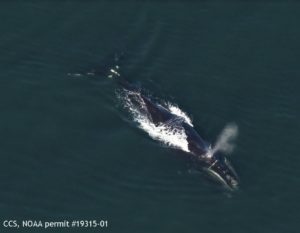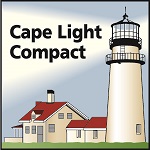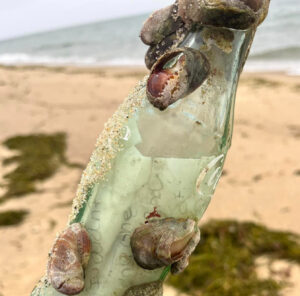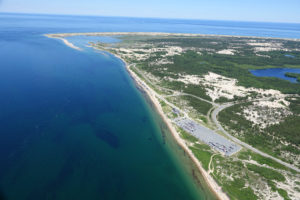PROVINCETOWN – The Center for Coastal Studies’ (CCS) aerial surveillance team spotted nine critically endangered North Atlantic Right Whales in Cape Cod Bay, the first confirmed sighting of the species in the Bay this season.
Among the whales photographed during the survey flight were whales that have visited Cape Cod Bay in the past, individually identified by natural markings as Arpeggio, Marble, and Meridian.
“I just heard from my research team that they’ve been matching whales, they’re easily identifiable. The update is that yesterday we thought we had seven, it looks like we have nine. There were two more individuals,” said Dr. Charles “Stormy” Mayo, Senior Scientist at CCS.
“This is a very special location where one of the rarest large mammals, certainly one of the rarest whales, comes each year. It looks like the season has begun.”
One of the rarest of the world’s large mammals, North Atlantic right whales visit Cape Cod Bay every winter and spring to feed on rich blooms of microscopic zooplankton.
CCS has surveyed Cape Cod waters in collaboration with the Massachusetts Division of Marine Fisheries every January since 1998. CCS started its aerial and boat surveys in late November thanks to special funding from several foundations, local businesses and individuals.
“With today’s sighting we now know that whales enter the area earlier than previously thought, information important to the effort to protect the species,” Dr. Mayo said.
CCS researchers identified 246 individual whales in Cape Cod Bay between January and May of 2018, more than half of the estimated 411 whales in the population.
No new calves were recorded in 2018 and only five were spotted in 2017, while three dead Right Whales have been found over the last year, down from 17 in 2017. The most common causes of death for those whales were entanglement and ship strike.
The dramatic decrease in the right whale population resulting from the low birth rate and high mortality prompted CCS to expand the aerial survey area to encompass the recently designated Right Whale Critical Habitat on Jeffreys Ledge, located off the coast of Massachusetts and New Hampshire, and extend the survey season by two months, from November through June.
“The important thing is that we’ve gotten some important funding that has allowed us to expand the time when we fly our aircraft and take out our boat because we suspected that the whales came in earlier than the first of January, which is when we’ve always started. Right Whales have come into the bay within the last week I imagine, so that is the beginning of the season,” Dr. Mayo explained.
The increased surveillance, known as the Right Whale Emergency Initiative, will improve the capacity for CCS to find and free entangled Right Whales and will expand the ability of federal and state agencies to protect the remnant population.
Real-time sighting reports from the survey team will also allow managers to take swift action to regulate fishing and shipping activities in areas not previously known to be frequented by the whales.
It is illegal for watercraft or aircraft of any kind to approach within 500 yards of a North Atlantic Right Whale without federal permission.
By TIM DUNN, CapeCod.com News Center

























